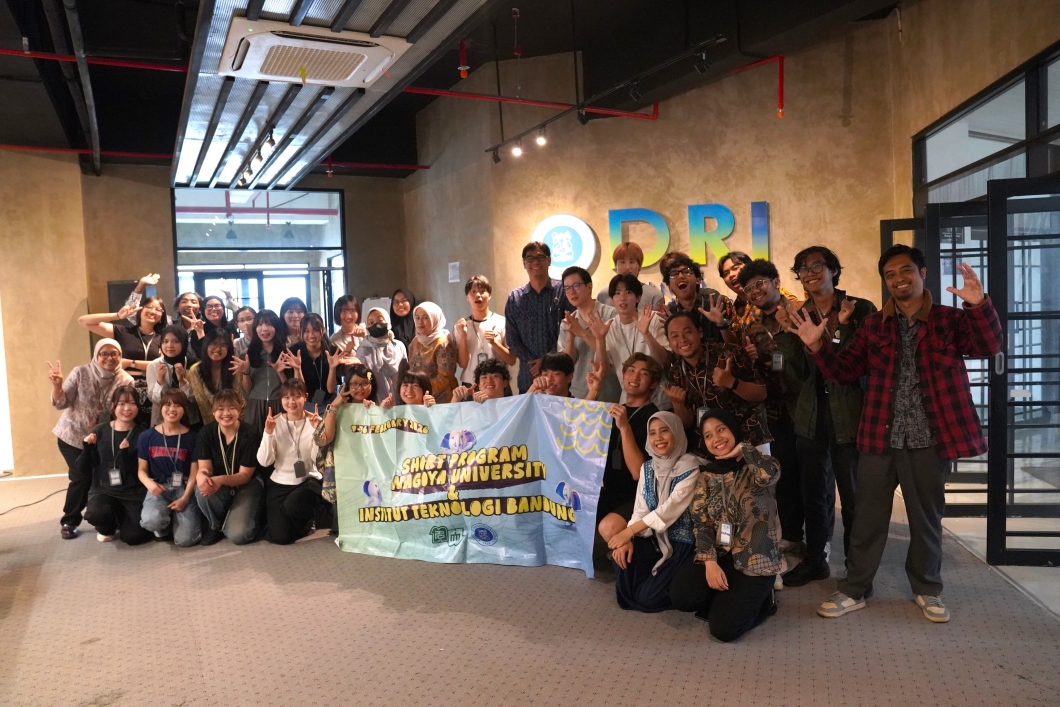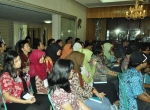FMAE ITB and Forum Dialog Nusantara Held an Open Discussion on National Aerospace Technology
By Adi Permana
Editor Adi Permana
BANDUNG, itb.ac.id – In recent years airplane industry has been hit hard by the decrease in mobility caused by the COVID-19 pandemic. In addition to that, an airplane is one of the highest carbon-emitting modes of transportation, therefore, a solution to reduce its environmental impact is urgently needed.
These two important topics became were discussed by the Faculty of Mechanical and Aerospace Engineering (FMAE) in Forum Dialog Nusantara on Friday (18/11/2022). The discussion which was titled "Future Technology Implementation in the Development of National Aerospace Industry" was held onsite at Labtek II FMAE ITB and was also broadcasted online via Zoom and YouTube.
Agung Sarwana became the moderator in this discussion which was attended by five panelists. The panelists are Ilham Akbar Habibie representing the manufacturing industry, the Dean of FMAE ITB Tatacipta Dirgantara representing the educational institution, Robertus Heru Triharjanto representing the National Institute of Aeronautics and Space BRIN, DKPPU Ministry of Transportation Capt. Boy Mauludin representing the government, and the Production Director of Dirgantara Indonesia Co. (PTDI) Batara Silaban.
According to Ilham Habibie, three families of technologies that crucial to master. First, regarding the material, we need to picture how to make an airplane from renewable materials. Second, regarding technology that can reduce carbon emissions such as by using battery or biofuel as its fuel.

The third point is regarding digitalization and simulation. The presence of AI allows us to identify the weakness of a design and to carry out its operational simulation from both the passenger and pilot points of view. Moreover, digital machining in building an airplane can decrease the complexity and the time needed therefore making the process more environmentally friendly.
Electrical propulsion is one of the technologies that are being tested by PTDI in developing its products to face the megatrend. Not only that, but PTDI also must possess an optimal quality cost delivery.
"We realized that with the presence of the 4.0 technologies such as the internet of things and augmented reality, it can be the key to success for us in integrating engineering and manufacturing. For the engineering sector, we already implemented a paperless engineering process. For the manufacturing sector, we are currently in a machines overhaul process," said Batara. The expectation is that after those machines are ready, PTDI will have an integrated engineering manufacturing process which finally can be utilized to create an efficient process, therefore, improving productivity.
Even if it looks promising, there are still some limitations in achieving these key technologies. One of PTDI's approaches to solve this problem is by cooperating with South Korea in building a fighter jet. The National Research and Innovation Agency (BRIN) is also actively researching these key technologies. A test that was recently finished by BRIN and PTDI are wind tunnel test for N219A's wing, tail, and float configuration.
"This is a long journey because the key technology that we need to master in Indonesia is composite materials, and this requires a lot of research and development," said Robertus Heru.
This year BRIN will carry out avionic research and development with an aim to master the auto-pilot technology for unmanned airplanes, which then can also be applied to a manned airplane. According to him, this avionic technology is highly valued in the global aeronautics and aerospace supply chain.
From the Government's point of view as the regulator, the Directorate General of Air Transportation has been actively building a network and coordinating with other international institutions such as ICAO and European Union.
"Currently multiple training are being carried out in order to keep updated with the technologies that are being developed in the aviation world. Meanwhile, for machine technology specialist, the government are working with international manufacturers to gain a license to hold a domestic validation and certification process," explained Capt. Boy.
The lack of universities with an Aerospace Engineering degree in Indonesia adds another challenge to the human resource improvement effort. Therefore, ITB is trying to prepare the human resources that are capable to fulfill the needs of the industry. This is done by giving various design projects in order to sharpen its students' problem-solving skills, improving their engineering fundamental understanding, and providing opportunities to be involved in independent engineering projects. In addition to that, FMAE ITB also carrying out research on decarbonization and digitalization.
"Regarding the decarbonization in an airplane design process: how material and its structure can be made lighter using the latest technology such as 3D printing, which was unavailable before, and reducing airplane's drag resistance by using better computational technology. Now we are utilizing AI and ML for shape optimization. So, we have already implemented some digitalization. We are also developing alternative fuels such as bioavtur, high altitude long endurance using solar panels, and electric motor. From the upkeep perspective: digital twin and robot for upkeeping," explained Tatacipta Dirgantara.
As what was said by the Dean of FMAE ITB, this dialogue is expected to give a new perspective and beneficial result in addition to attracting interest from stakeholders to be a part of this grand strategy in developing Indonesia's aeronautic industry.
Reporter: Ristania Putri Wahyudi (Mathematic, 2019)
Translator: Favian Aldilla R (Civil Engineering, 2019)




.jpg)
.jpg)


